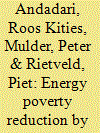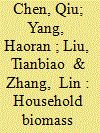|
|
|
Sort Order |
|
|
|
Items / Page
|
|
|
|
|
|
|
| Srl | Item |
| 1 |
ID:
103471


|
|
|
|
|
| Publication |
2011.
|
| Summary/Abstract |
The Korean coal industry is in a transition under low carbon policy through the steady reduction of coal production. Since consumer subsidy for the consumption of anthracites briquette in low-income households caused a distortion in domestic coal market, the so-called coupon program will be the first target in energy reform policy in order to induce fuel switching from anthracites to alternative clean energy. This paper tries to identify various factors that influence households' fuel switching decision. Disutility from briquette consumption is also considered as an important factor. Using the 2007 census data on briquette-consuming households, it is found that the coupon program provides an adverse effect to switching fuels to clean energy while the disutility of briquettes is positively associated with the probability of fuel switching. However, the empirical finding suggests that the policy alone attempting to remove coupon program may fail to switch fuels unless the cost of boiler changes is substantially reduced through the provision of accessible networks to alternative energy sources. It indicates that reform policy for consumer subsidy must be understood in line with more comprehensive regional energy plans to resolve energy poverty issue.
|
|
|
|
|
|
|
|
|
|
|
|
|
|
|
|
| 2 |
ID:
128000


|
|
|
|
|
| Publication |
2014.
|
| Summary/Abstract |
In low- and middle-income countries, Liquefied Petroleum Gas (LPG) can be an attractive alternative to the widespread use of traditional kerosene. Not only is LPG a relatively clean, safe and cost-effective fuel for households, its large-scale adoption also reduces the heavy burden of kerosene consumption subsidies on government budgets. Against this background, we evaluate the impact of a large government program to substitute LPG for kerosene in Indonesia. Using a household survey across urban, suburban and rural regions we find that this program was very effective in causing a large scale shift from kerosene to LPG. This shift was positively influenced by level of education, household size and household income. Contradicting the energy-ladder model, the LPG program, reinforced by an increase in the price of kerosene, led to increased stacking of fuels, including increasing consumption of both electricity and traditional biomass. In addition, our analysis shows that the LPG program failed to substantially reduce the overall number of energy-poor people, but it has been effective in alleviating extreme energy-poverty. Finally, we find that medium and higher income households in suburban areas benefitted most from the LPG program.
|
|
|
|
|
|
|
|
|
|
|
|
|
|
|
|
| 3 |
ID:
177106


|
|
|
|
|
| Summary/Abstract |
The German federal government has set a target for German industry to reduce its GHG emissions by 49%–51% by 2030 compared to 1990. Fuel switching to electricity and biomass is a potential measure to meet this target. In this article, we simulate the contribution of fuel switching by applying economic incentives and regulatory measures. The policy instruments of a CO2 price and technology-specific subsidies are applied with varying intensity. In addition, we simulate accelerated stock replacement and a ban on new fossil-based steam generation systems. Results show that combining fuel switching and energy efficiency could achieve emission reductions of 50% by 2030 compared to 1990 only combined with considerable economic pressure (up to 300 €/tCO2) and financial support for electricity-based process heating.
|
|
|
|
|
|
|
|
|
|
|
|
|
|
|
|
| 4 |
ID:
150928


|
|
|
|
|
| Summary/Abstract |
It is widely known that a switch from traditional biomass energy to modern clean, safe and efficient energy could improve local rural livelihoods by enhancing the access to ‘high quality’ energy and reducing the negative impacts of traditional biomass energy on health, environment and living standards. Hence, in this paper, we used alternative-specific conditional logit model (ASCLM) to examine the rural household energy choice behaviors in Sichuan Province of China from the perspective of revealed and stated preferences. The results show that the fuel switching in our study region is not a simple unidirectional process from traditional biomass energy to modern fuels as incomes improve. Household energy choice behaviors could be not only affected by energy-specific characteristics such as fuel price, smoky level and safety risk, but also influenced by household-specific factors such as income level, age and educational level of the decision maker, household demographic structure, number of people frequently eating at home, distance to the nearest biomass collecting spot and household location, suggesting that government should attach more importance to simultaneously improve energy quality, control energy price and enhance household socio-economic status.
|
|
|
|
|
|
|
|
|
|
|
|
|
|
|
|
| 5 |
ID:
163552


|
|
|
|
|
| Summary/Abstract |
Discussions about “peak oil demand” tend to focus on passenger vehicles, often from a US and European perspective. These discussions often ignore other markets, such as marine transport, which collectively would also need to show a reduction in demand if oil consumption were to reach an inflection point. We explore the outlook for marine bunkers, a niche market that accounts, depending on estimates, for up to 7% of the demand barrel. We focus on the possible impact of new environmental restrictions that aim to drastically reduce sulfur oxide (SOx) emissions from ships as of January 2020, placing them against the background of past innovations that have been reshaping ships’ fuel consumption patterns and assessing their likely impact on future innovation in the sector. We conclude that the rules might paradoxically end up slowing down what might have otherwise been a more rapid transition of the shipping market away from traditional bunker fuels. The rules will, however, adversely affect simple refineries and producers of heavy, sour crude oil grades, whose prices are sometimes indexed to that of high sulfur fuel oil (HSFO).
|
|
|
|
|
|
|
|
|
|
|
|
|
|
|
|
| 6 |
ID:
166722


|
|
|
|
|
| Summary/Abstract |
The current Korean administration is driving change in the power sector by gradually phasing out nuclear power plants, expanding the use of renewable energy, and imposing restrictions on the operation of coal power plants. Considering these changes, the marginal abatement cost (MAC) curve would provide crucial information to determine an appropriate greenhouse gas reduction target, especially for 2030. This study derives the MAC curves for the Korean power sector in 2030 using a bottom-up optimization model with three scenarios based on different carbon pricing schedules. In addition, the carbon price required to achieve the CO2 emission targets in the Korean power sector in 2030 are estimated. The results show that a carbon price of 135–157 US$/tCO2 would be required to achieve the 2030 emission target for the power sector. By comparing the MAC curves of three different scenarios, we can reiterate the fact that early action regarding climate change mitigation is more effective and efficient than delayed action.
|
|
|
|
|
|
|
|
|
|
|
|
|
|
|
|
| 7 |
ID:
110698


|
|
|
|
|
| Publication |
2011.
|
| Summary/Abstract |
In 2007 Indonesia undertook a massive energy program to convert its primary cooking fuel from kerosene to LPG in more than 50 million households. This megaproject, to be completed in late 2011, provided an improved household cooking fuel, with its associated benefits in user costs, cleanliness, convenience, and environment, and reduced the government's huge subsidy for petroleum fuels. Presented from the perspective of Pertamina, Indonesia's sole NOC, and the program implementer, this paper describes the background of the fuels situation, the planning stages, including the preparatory analytical work, targeted market surveys and tests, and the subsequent building of the financial, technical, and institutional models for carrying out the program on an expeditious schedule. It presents the project's major execution steps, results of the program to date, and the unique institutional roles of each party, including the activities and benefits for the government, Pertamina, the public, the industry, and the crucial agents in the fuel supply chains. Finally there is a retrospective policy analysis and a discussion of key factors and challenges in the execution of Indonesia's largest-ever energy initiative to provide improved cooking fuel.
|
|
|
|
|
|
|
|
|
|
|
|
|
|
|
|
|
|
|
|
|